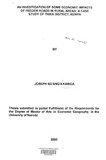| dc.description.abstract | . In the rural areas of Kenya, the nature of roads is identified as, but one of a number of interrelated constraints to development. In these areas, the cost of transport is a significant factor affecting agricultural development and modernisation. This study generally focuses on the economic impacts of rural infrastructure narrowly defined as roads.
The primary objective of this study is therefore to identify, describe and analyse some of the economic impacts of the feeder roads in the rural economy of Thika district. The economic impacts of the feeder roads are examined by investigating their influences on non-farm economic activities, horticultural land use and on farm gate prices.
Four major hypotheses were formulated and their validity tested using primary and secondary data collected. These are:
(1) There is no significant relationship between proximity of household farms to feeder roads and the farm gate prices of french beans.
(2) There is no significant relationship between accessibility of household farms to feeder roads and proportion of land used for commercial horticultural farming.
(3) There is no significant relationship between prices of agricultural commodities in retail markets and the accessibility of these markets.
(4) Rural roads do not significantly influence the size and location of non-farm economic activities in the rural areas.
Qualitative and quantitative analyses are used in the study to establish essential facts, perform test of hypotheses and enable relevant conclusion( s) to be drawn Initially a comprehensive literature review is attempted with the purpose of extracting essential information from available secondary sources.
The major findings of this study were that rural feeder roads influences significantly the farm gate prices of agricultural commodities, horticultural land use and the locations of non farm economic activities in the rural economy.
The significant contribution of this study is in the area of rural development planning in Kenya. The study empirically shows that rural roads have an important role to play in the development of these areas, given that they positively
influence some parameters of growth and development in the rural economy
The study recommends that planners and policy makers in the government, should lay more emphasis in rural infrastructure to ensure rapid development in these areas. The study also recommend further studies to be undertaken in other rural areas of Kenya to determine how rural infrastructure affects the growth and development of these areas. | en |

